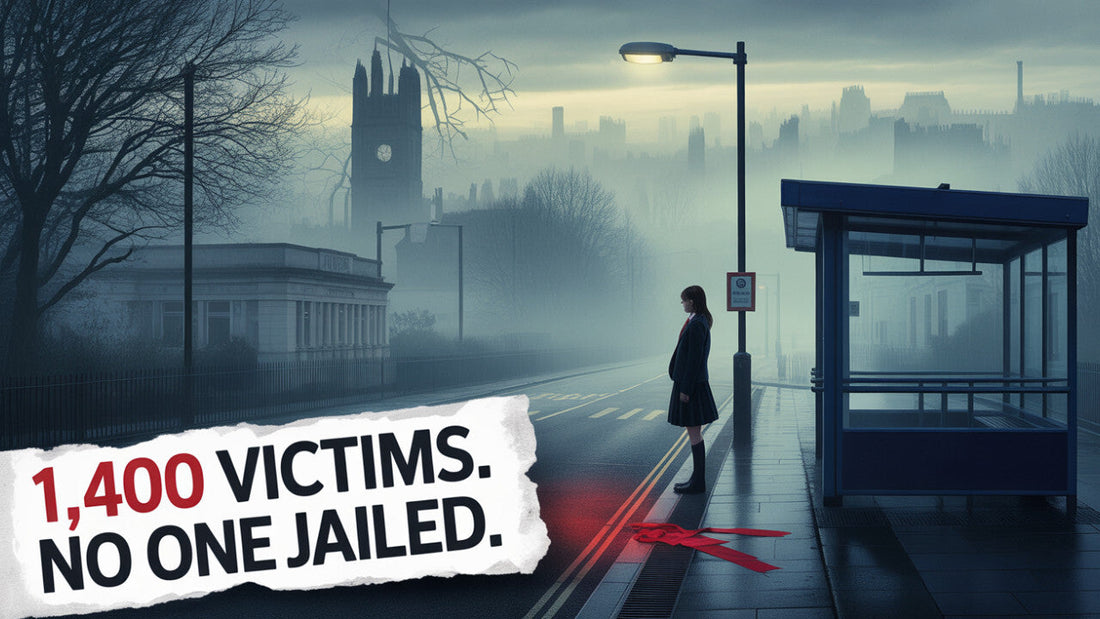
Grooming Gangs: How British Authorities Failed Young Girls for 30 Years
Share
1,400 girls in one town — screamed for help, got silence.
Imagine that. A chilling declaration that captures the horrifying truth of a decades-long betrayal.
For over three decades, across numerous towns in the UK, children were treated as commodities, passed around like party favours in a dark game, while the very people paid to protect them looked the other way. This isn't just a story of individual monsters; it's a profound, systemic failure.
Today, we're going to track how glaring warning signs were ignored, how crucial reports were buried under layers of bureaucracy, and how brave whistle-blowers were punished — all because the truth was deemed too awkward, too inconvenient, too explosive to ever be said out loud.
It’s a narrative of institutional cowardice that allowed unimaginable abuse to flourish.
The First Red Flags
The warning bells began ringing quietly, almost imperceptibly at first, in the mid-nineties.
In Rotherham, social workers were meticulously logging names, noting the disturbing regularity of men picking up primary-school girls outside kebab shops. Their files meticulously documented identical car registrations, identical flats, and the heartbreakingly identical bruises on the young victims.
But what was the official response?
Police dismissed it all as “consensual messing about.”
Can you believe it? A twelve-year-old, scarred and vulnerable, was outrageously labelled “sexually aggressive” in case notes, effectively blaming the victim. Her abusers, meanwhile, were never even interviewed, let alone brought to justice.
This wasn't just a missed opportunity; it was a deliberate turning of a blind eye, setting a dangerous precedent for years to come.
The Escalation
This wasn't an isolated incident, a single tragic oversight.
Across Yorkshire, Derbyshire, and Greater Manchester, a horrific pattern cloned itself, spreading like a virus.
We saw councils booking taxis, effectively ferrying children in their care directly to drug-dens and places of exploitation.
Perpetrators hosted depraved “sex parties” above take-aways, where victims were paid not in cash or kindness, but in vodka and cigarettes.
These weren't hidden crimes; they were happening in plain sight.
In 2002, a dedicated outreach worker in Rochdale, aghast at what she was witnessing, sent a twelve-page memo detailing the horrors to the Crown Prosecution Service.
Her reward?
The case was summarily dropped for “lack of credible witnesses.”
It seems the authorities were simply unwilling to believe what was right in front of them — or perhaps, unwilling to act.
The Wall of Silence
The institutional failures ran deep, creating an impenetrable wall of silence.
Inside police stations, officers were reportedly joking about “P*** shaggers,” casually dismissing the victims and their heritage, while actively refusing to type up statements that could have led to arrests.
Social-services managers, paralysed by political correctness, worried that highlighting the ethnicity of predominantly Pakistani-British offenders would “play into BNP hands,” fearing accusations of racism more than the abuse itself.
This fear became a convenient shield.
One risk-assessment form, acknowledging the ethnicity of suspects as a red flag, was bizarrely filed away in a locked drawer — effectively burying the truth to avoid a difficult conversation.
This wasn't just negligence; it was an active suppression of justice, driven by a profound and misplaced fear of inflaming racial tensions.
The victims, predominantly white and vulnerable, were sacrificed on the altar of political expediency.
The Price of Speaking Up
Those who dared to challenge this suffocating silence paid a heavy price.
Jayne Senior, a courageous youth-project manager, kept boxes of damning evidence under her desk — a testament to the scale of the cover-up.
When she finally handed those files to The Times in 2011, council officials didn't investigate the abusers — they tried to scrap her funding, aiming to silence her.
MP Ann Cryer, who tirelessly campaigned for the victims, was chillingly told she was “racist to care.”
Imagine that: caring for abused children was deemed racist.
A detective who pushed for arrests, refusing to be part of the cover-up, found himself sidelined to traffic duties — his career effectively derailed.
This culture of punishing whistle-blowers sent a clear message:
Stay silent, or face the consequences.
The Collapse
The dam finally broke in 2014.
The Jay Report landed like a bombshell, its pages confirming the grim reality:
At least 1,400 children in Rotherham alone had been failed by a system steeped in “blatant collective denial.”
Within weeks, the Rotherham council leader resigned in disgrace, and the South Yorkshire Police & Crime Commissioner quit.
The truth, finally, was out.
Convictions began to trickle through:
-
19 men in Rochdale
-
9 in Telford
-
5 in Newcastle
But these numbers, while significant, barely scratch the surface.
Estimates suggest hundreds of offenders still walk the very streets those kids grew up on — free and unpunished.
The sheer scale of the abuse is still not fully known; as a 2022 inquiry stated, it’s "simply not possible to know the scale" nationally.
But the fight for justice continues. A national statutory inquiry was announced for 2025, and new measures like the Crime and Policing Bill aim to improve safeguarding, make grooming an aggravating factor in sentencing, and remove time limits on abuse claims.
Call to Action
If this story makes your blood boil — if it fills you with righteous anger — then hit subscribe, follow Reform, and help us demand the truth.
Survivors have bravely told us that silence feels like the abuse is happening all over again. We won’t be silent. We won’t let this be swept aside again.
Final Word
Thirty years of memos, risk forms, and even DNA kits were left to gather dust — ignored, dismissed, or locked away.
Thirty years of children were told they were making “lifestyle choices” instead of being recognised as victims of horrific crimes.
The new National Crime Agency probe and ongoing inquiries may indeed jail a few more men, and that's a start.
But the bigger, more insidious crime here is institutional cowardice — and that still hasn’t been properly sentenced.
Until the councils, the police forces, and the social services that looked away are hauled into court alongside the abusers, Britain’s shame isn’t history — it’s on repeat.
A horrifying cycle.
Waiting to happen again.
